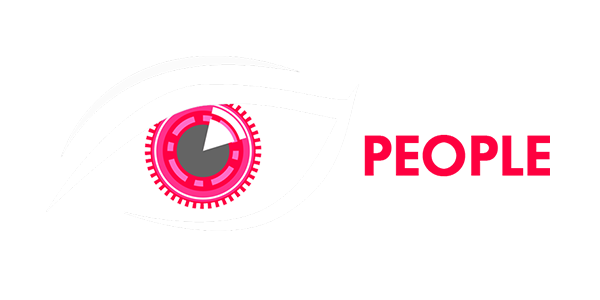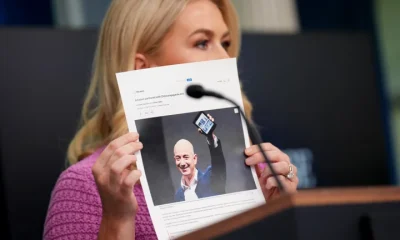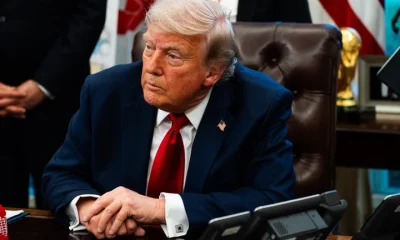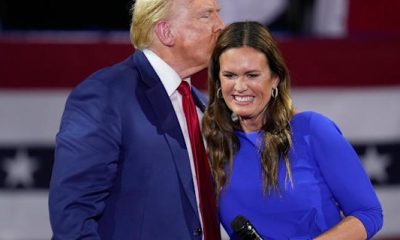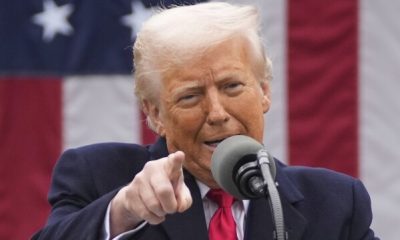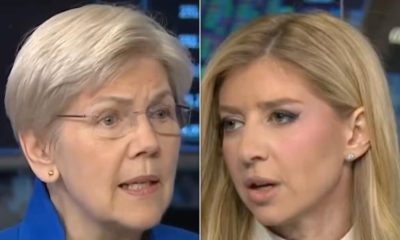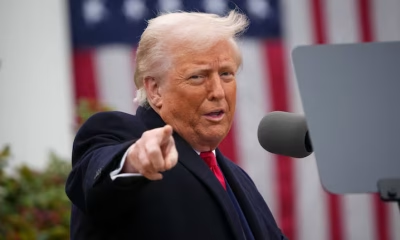NEWS
Trump’s Spin On His Tariffs Conveniently Leaves 1 Major Thing Out
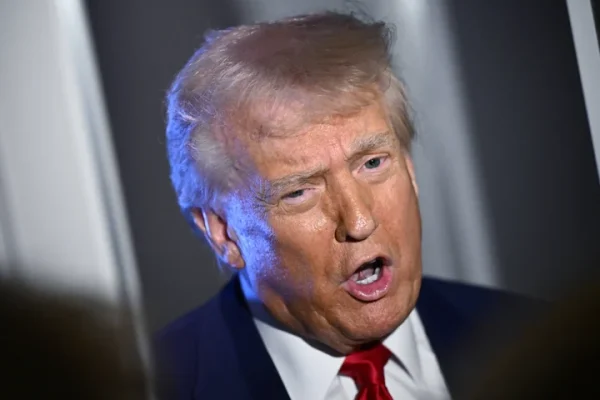
The president’s loyal foot soldiers praised him for halting the mess he created — but they all conveniently left something out.
The White House took a victory lap on Wednesday when the stock market surged in the wake of the announcement that President Donald Trump was backing down on some of the tariffs he announced last week. But their glee was obscuring the fact that they’d just announced a plan that was possibly worse.
Trump posted to his TruthSocial account that he was doing a 90-day pause on the so-called reciprocal tariffs, he had announced on “Liberation Day” the previous week — but he was upping China’s to 125% because, unlike the other countries, they had retaliated. The White House would clarify on Thursday that the new tariff on China was actually 145%.
Despite the jaw-dropping increase, government officials heaped praise on Trump, alleging that this hastily thrown together social media post announcing the 90-day pause was the plan all along. However, the administration also claimed that their quasi-reversal came only after 75 countries reached out to negotiate new trade deals, though they didn’t divulge any details. (Unfortunately, no one bothered to tell the Trump official who was literally defending the trade policy on the House floor when the post went live.) Less than 24 hours after Trump’s announcement, the markets began to tank again.
“This is still a massive trade war,” Emily Gee, the senior vice president for inclusive growth at the Center for American Progress, a left-leaning policy organization, told HuffPost. “It’s still going to cost American families thousands more dollars each year.”
After Trump initially unveiled the tariffs last week, much of the concern has focused on the economy’s biggest metric: the stock market. Stocks spent days in turmoil, and economists warned of the impact on businesses and industries that would have to pay more on everything from lumber to bananas to machines that produce microchips.
And while Trump and his acolytes spent days posting on social media and making TV appearances to assure the public that this huge increase in prices, which would inevitably trickle down to consumers, was actually good, the White House finally capitulated and walked back the tariffs. Sort of.
The president’s loyal foot soldiers boasted about Trump’s tariffs about-face. “You have been watching the greatest economic master strategy from an American President in history,” White House deputy chief of staff Stephen Miller posted on X (formerly known as Twitter).
“Many of you in the media clearly missed the art of the deal, you clearly failed to see what President Trump is doing here,” White House press secretary Karoline Leavitt told reporters at a Wednesday briefing, referring to the president’s 1987 book, “The Art of the Deal” that details his supposed business savvy. (He has filed for bankruptcy six times.)
Bill Ackman, billionaire hedge fund manager and noted Trump follower, had been complaining about the stock market’s dismal performance in the wake of the trade war. But when Trump appeared to back down, he was quick with the adulation.
“This was brilliantly executed by @realDonaldTrump. Textbook, Art of the Deal,” he said.
But don’t be fooled. Trump’s trade war is still on, and it’s going to screw families particularly hard.
The cringe-inducing praise didn’t include mention of the 10% tariff on every country that the president announced last week, which remains in place. Coupled with the massive tax increase on Chinese goods, these are disastrous: Yale University’s Budget Lab estimates that the tariffs will cost the average household $4,700.
The Chinese tariffs are so high that the United States is now in uncharted territory in its trade relationship with the country. “We don’t have much empirical experience with this,” Steve Suranovic, a professor of economics and international affairs at The George Washington University, told HuffPost.
Such an astronomical tariff could end up being cataclysmic.
“The prices [on goods] will be so high that we will stop trading with them, and then we get no revenue from them,” Suranovic said.
That could be life-and-death for the financial health of Americans. Among the goods that are about to get way more expensive are clothes, toys, car seats strollers — all items that are absolute must-haves for families.
According to a survey done by BabyCenter, new parents spend about $20,000 in the first year of a child’s life. Much of that is for quotidian items like baby clothes, or diapers or formula, areas where consumers do have some choices on what to buy: Pampers, for example, proclaims that their diapers are made in the U.S., although it also notes that some materials are imported. And much of the clothing worn by Americans is manufactured overseas, with China being the biggest — but not only — source. Even for items made in the U.S., much of the raw material used to manufacture them is often imported.
And then there are the places where there are few, if any, options: Some gear required to keep your baby safe, like car seats, are mostly manufactured in China, making it more difficult for new parents to find items that won’t be impacted by the tariffs. Nor are hand-me-downs or secondhand purchases possible, as used car seats are generally considered unsafe since the new owner may be unaware if the seat has been in a crash or damaged in some way.
“I am really worried as an economist and as someone with a family,” Kara Reynolds, an economics professor at American University, told HuffPost. “I don’t see Trump backing down, and I don’t see China backing down.”
If essentials like these rise in price, parents may have to spend more than they have or even delay having children altogether.
Because it’s not just kid-related items that are about to increase in price, but goods like food and car parts that are a necessary part of life. For example, Guatemala, which will still have a 10% tariff, is one of the largest suppliers of bananas, broccoli and cauliflower (nutritional items that are essential, as anyone who has tried to get a kid to eat something other than chicken nuggies knows). Then there are things like cars and car parts needed for repairs, the tariffs for which Trump has kept steady at 25%, that are going to hit your wallets.
The steep increase in consumer goods will be a disaster for families with less money to spend — any increase is going to be a bigger bite out of their budgets. There’s a risk that families already struggling to make ends meet will fall into, or deeper into, poverty.
“Lower-income families are going to be hit the hardest,” Gee said. “These households are already buying the value pack and generic brands.”
But the Trump administration doesn’t seem to be considering what happens to the families who won’t be able to afford groceries because of its trade war. In fact, the Republican Party is diligently working to tear up what’s left of the safety net. As a way to implement Trump’s agenda of massive tax cuts for the rich and large-scale deportations, House Republicans just passed the framework for the next government budget that aims to save $1.5 trillion. Experts say that the only way to make those numbers add up is to make cuts to programs such as Medicaid, which provides health care for low-income people, or food assistance for poor families and individuals.
“If we enter a period where there’s less income and no jobs, we could find Medicaid and food assistance just isn’t there,” Gee said. “It’s a twofer in terms of bad economic times.”
But if you’re trying to plan your economic future, good luck, because none of this is set in stone. Even the fact that many of the planned tariffs were ultimately rolled back comes with its own set of concerns, including the availability of goods and the availability of jobs.
“If you’re a business owner who needs to make decisions about what to order for the Christmas season, this is a really scary time,” Gee said. “Many businesses will hold off on that or just lay off workers.”
With trade policy constantly evolving, economists say some people will hold off on purchases or drastically reduce their spending while they wait to find out if we’re going to have a recession or if Trump will announce another genius idea, like placing tariffs on an island exclusively populated by birds.
“People are looking at the stock market, and they’re looking at these price increases,” Reynolds said. “They’re going to think, ‘I should not be spending money.’ It becomes a self-fulfilling prophecy.”
Trump announced the 90-day pause just two days after quickly shooting down an erroneous social media post that such a reprieve was in the works. The night before the TruthSocial post, Trump sounded defiant on his trade policies, telling attendees at the National Republican Congressional Committee dinner that he was definitely in control of the situation.
“I know what the hell I’m doing,” he said. “I know what I’m doing, and you know what I’m doing too.”
